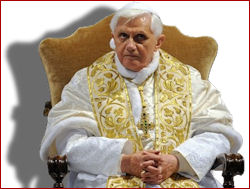Privately and publicly, Phil Johnson and I have marveled at the spirit of some moderns regarding God's truth. We've wondered how Christianity could have survived, had it been animated by this spirit at its inception. We've wondered what the early martyrs would think of today's sofa-sitting latte-sippers.
 One breed that apparently considers itself exempt from All That has long been the Academy, on which subject we've offered some thoughts previously. These are scholars; they're a breed apart from, well, from the folks who pay their salaries. That's because they've had the benefit of special training and special discipline, and thus are privy to special knowledge. They're specialists. They know facts and truths that mere garden-working pastors and ditch-digging churchgoers just can't understand.
One breed that apparently considers itself exempt from All That has long been the Academy, on which subject we've offered some thoughts previously. These are scholars; they're a breed apart from, well, from the folks who pay their salaries. That's because they've had the benefit of special training and special discipline, and thus are privy to special knowledge. They're specialists. They know facts and truths that mere garden-working pastors and ditch-digging churchgoers just can't understand.It is important (to these folks) that we respect these folks, that we not malign or criticize them or make them feel or look bad. No matter what they say or write, we mustn't challenge their convictions or character. If they tell us that they fit in with a school's doctrinal position or confession, we must take their word for it. If they tell us that their books or lectures or articles are sound and orthodox, well then, they wouldn't lie or dissemble, would they? They're academics.
Their defenders and enablers surely communicate to all that not much is at stake, that it isn't anything to "get het up" about. They'll spill equal amounts of ink lauding the Christian characters of those who depart from anything the great unwashed would recognize as a commitment to inerrancy, and casting aspersions on less sanguine critics or opponents. Because it isn't as if we should expect someone to commit himself to a position as being binding on his conscience, as being something... oh, I don't know... worth dying for, or anything so drastic.
For instance, we recently read this:
Belief in the truthfulness of the Bible, then, like belief in the truthfulness of Christianity or materialism or anything else [!], is provisional—scholars hold to it (or not) on the basis of the evidence they've seen. Affirming the Bible is true, just like affirming the Christian creeds, is a statement of current conviction: “Based on what I know now, I believe that the Nicene Creed/the New Testament is correct, when properly understood.” It doesn't prevent individuals from researching carefully, nor from abandoning or adjusting their commitment if the evidence takes them that way; the changes of conviction, affiliation, and worship practices of many of the “aha” scholars, as well as those who have moved the other way, should be evidence enough. In some cases, no doubt, belief in inerrancy is associated with fearmongering, closed-mindedness, misrepresentation, and rudeness. But the same is true of evangelicalism, and Protestantism, and Christianity as a whole, let alone atheism, Islam, feminism, materialism, and virtually all beliefs held by human beings. I’ve seen a fair bit of it on Pete Enns’s own blog, and I imagine he’d say the same of mine.Where did I see that? Patheos? BioLogos? Huffington Post? No; in the rarified air of TGC — which, I remind you, ostensibly stands not for The Great Clubhouse, but The Gospel Coalition; and which, I am sure, is funded and read and has its conferences swell with people who certainly are fiercely committed to the Gospel and the truths that underlie it.
This was a post at that site. And since one of the commenters dubbed this article "incredibly thoughtful and nuanced," well then, from one perspective, it must be considered a rousing success, a paradigm of carefulness and all that.
I made a comment in the meta; Phil shared this in Twitter:
“Belief in the truthfulness of the Bible…is provisional…” Wow. Quite a startling thing to read on the TGC website. http://t.co/jBUF0zEyoE
— Phil Johnson, ن (@Phil_Johnson_) August 27, 2014
Woke up this morning to some pretty angry misrepresentations of my @TGC article. Why do Christians do this, I wonder? pic.twitter.com/wGwFhI7H6x
— Andrew Wilson (@AJWTheology) August 27, 2014
Remarkably enough, though, while unable to make sense of Phil's eleven words out there in print, he can read Phil's mood from the unknowable privacy of Phil's heart— and it's angry. Perhaps Phil is one of those scholarship-despising, progress-slowing fearmongerers lamented in the article? Phil certainly isn't being treated to the paeans of praise that the author heaped on those "thoughtful, insightful Christian brothers and sisters" and "good guys" in the Academy who find fault with the Bible.
So: It's all well and good to tell the unwashed that the fear of Yahweh is the beginning of knowledge and wisdom (Prov. 1:7; 9:10). For them, maybe it is. For academics, however, it is at best a provisional conclusion tentatively reached, perhaps, at the end of investigation. It is held as today's conviction, which may be overridden tomorrow, depending on what our real starting-point dictates tomorrow.
Seriously: where would we be, had Doctor Martin Luther said "Here I stand —provisionally. At the moment. I think. Today. But tomorrow... who knows?"
Regardless, I wasn't going to say anything further about it — knowing the waves of anger and offense and indignation that it will provoke from folks who already haven't much use for me, if the usual "ignore it and it will go away" method employed for our posts doesn't serve as well as it usually does for them.
But then I came on this from Spurgeon. As so often, once Spurgeon says a thing, it can't be much improved on. So I'll give him the closing word, and he speaks for me:
I have often wondered whether, according to the notions of some people, there is any truth for which it would be worth while for a man to go to the stake. I should say not; for we are not sure of anything, according to the modern notion. Would it be worth while dying for a doctrine which may not be true next week? Fresh discoveries may show that we have been the victims of an antiquated opinion: had we not better wait and see what will turn up? It will be a pity to be burned too soon, or to lie in prison for a dogma which will, in a few years, be superseded. Brethren, we cannot endure this shifty theology. May God send us a race of men who have backbones! Men who believe something, and would die for what they believe. This Book deserves the sacrifice of our all for the maintenance of every line of it.
[C. H. Spurgeon, The Metropolitan Tabernacle Pulpit Sermons, vol. 35 (London: Passmore & Alabaster, 1889), 264.]Aha, indeed.
And amen.


















 Instead, Biologos says explicitly, "
Instead, Biologos says explicitly, "

 few years ago we had one of those long comment-threads driven mainly by the skepticism of a single persistent commenter. This guy was a character who posted under the pseudonym "Touchstone," and he continually questioned the authority and accuracy of Scripture—while insisting that he was a believer.
few years ago we had one of those long comment-threads driven mainly by the skepticism of a single persistent commenter. This guy was a character who posted under the pseudonym "Touchstone," and he continually questioned the authority and accuracy of Scripture—while insisting that he was a believer.


 I mean, this is a historical account, right? So it doesn’t seem very problematic to say, without being very cheeky, "The rest of the day, cent. Pay attention."
I mean, this is a historical account, right? So it doesn’t seem very problematic to say, without being very cheeky, "The rest of the day, cent. Pay attention." And I bring this up not to impugn the clarity of Scripture, but to instead ask what it means to have a class of literature which conveys historical facts. In the first place, we can see that not every minute detail has been included in Scripture – how often Jesus drank water, for example, is not included in the holy writ. In the second place, there are massive omissions of dates and time – so much so that there's no way to say that the "synoptic" Gospels actually list the events of Christ's life as if they were a travelogue.
And I bring this up not to impugn the clarity of Scripture, but to instead ask what it means to have a class of literature which conveys historical facts. In the first place, we can see that not every minute detail has been included in Scripture – how often Jesus drank water, for example, is not included in the holy writ. In the second place, there are massive omissions of dates and time – so much so that there's no way to say that the "synoptic" Gospels actually list the events of Christ's life as if they were a travelogue. That's going to rub a lot of people the wrong way, but who asked them? Here's what you can't do with the Bible: you can't demand that it be "narrative" and not define what kind of "narrative" it is, especially in its diversity of text types. But once you define its genre – its type by book and author – you then have the broad opportunity to read and receive what's written as it was intended to be received.
That's going to rub a lot of people the wrong way, but who asked them? Here's what you can't do with the Bible: you can't demand that it be "narrative" and not define what kind of "narrative" it is, especially in its diversity of text types. But once you define its genre – its type by book and author – you then have the broad opportunity to read and receive what's written as it was intended to be received.


 Dan is off today, and I'm loaded for broke at work, but I had an old post from my blog worth sharing today; I hope you find it useful as you were hoping for the poly-glotinal brilliance of DJP but youinstead have to settle for my poor sister of a post.
Dan is off today, and I'm loaded for broke at work, but I had an old post from my blog worth sharing today; I hope you find it useful as you were hoping for the poly-glotinal brilliance of DJP but youinstead have to settle for my poor sister of a post. John MacArthur's excellent book on Bible study,
John MacArthur's excellent book on Bible study, 


 And this happens in all translations of the Bible, including the KJV, the NASB and especially in the ESV. However, Dr. Ryken seems to make the case that the practice of doing this across the board in order to improve the reader's basic comprehension of the ideas of the text is inherently disreputable and undesirable for philosophical reasons. The irony here is that I agree with his objection but I disagree with the force with which he makes it. By a long shot, this is best exemplified by his lumping together of the NIV and the Message as two types of the same kind of Bible translation -- and this is simply a category error. Everyone by now knows that the Message is a paraphrase and not intended to do anything but, well, paraphrase the original text rather than translate it. And while his system of explaining this issue may simply call
And this happens in all translations of the Bible, including the KJV, the NASB and especially in the ESV. However, Dr. Ryken seems to make the case that the practice of doing this across the board in order to improve the reader's basic comprehension of the ideas of the text is inherently disreputable and undesirable for philosophical reasons. The irony here is that I agree with his objection but I disagree with the force with which he makes it. By a long shot, this is best exemplified by his lumping together of the NIV and the Message as two types of the same kind of Bible translation -- and this is simply a category error. Everyone by now knows that the Message is a paraphrase and not intended to do anything but, well, paraphrase the original text rather than translate it. And while his system of explaining this issue may simply call 









